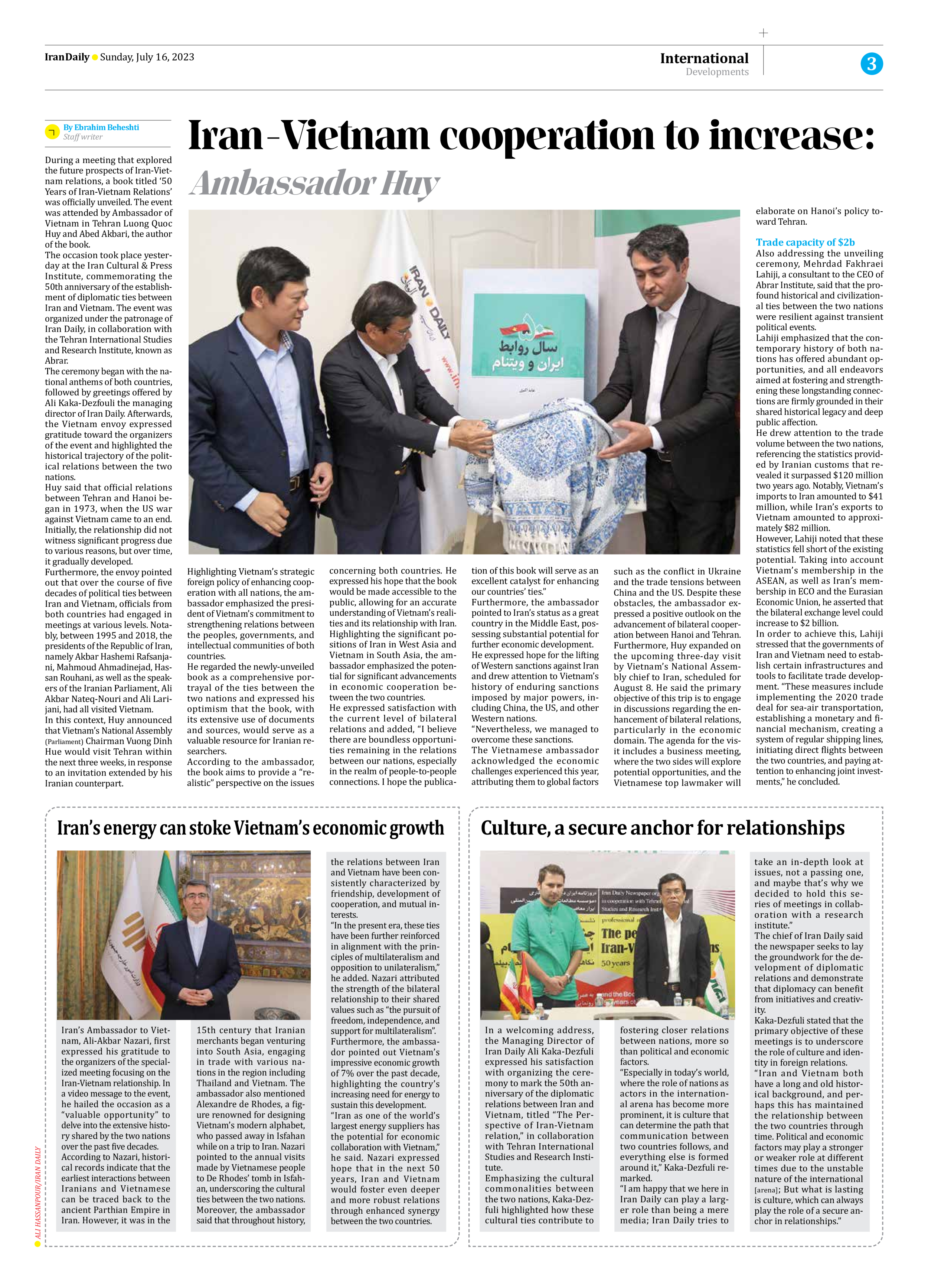
Iran-Vietnam cooperation to increase: Ambassador Huy
During a meeting that explored the future prospects of Iran-Vietnam relations, a book titled ‘50 Years of Iran-Vietnam Relations’ was officially unveiled. The event was attended by Ambassador of Vietnam in Tehran Luong Quoc Huy and Abed Akbari, the author of the book.
The occasion took place yesterday at the Iran Cultural & Press Institute, commemorating the 50th anniversary of the establishment of diplomatic ties between Iran and Vietnam. The event was organized under the patronage of Iran Daily, in collaboration with the Tehran International Studies and Research Institute, known as Abrar.
The ceremony began with the national anthems of both countries, followed by greetings offered by Ali Kaka-Dezfouli the managing director of Iran Daily. Afterwards, the Vietnam envoy expressed gratitude toward the organizers of the event and highlighted the historical trajectory of the political relations between the two
nations.
Huy said that official relations between Tehran and Hanoi began in 1973, when the US war against Vietnam came to an end. Initially, the relationship did not witness significant progress due to various reasons, but over time, it gradually developed.
Furthermore, the envoy pointed out that over the course of five decades of political ties between Iran and Vietnam, officials from both countries had engaged in meetings at various levels. Notably, between 1995 and 2018, the presidents of the Republic of Iran, namely Akbar Hashemi Rafsanjani, Mahmoud Ahmadinejad, Hassan Rouhani, as well as the speakers of the Iranian Parliament, Ali Akbar Nateq-Nouri and Ali Larijani, had all visited Vietnam.
In this context, Huy announced that Vietnam’s National Assembly (Parliament) Chairman Vuong Dinh Hue would visit Tehran within the next three weeks, in response to an invitation extended by his Iranian counterpart.
Highlighting Vietnam’s strategic foreign policy of enhancing cooperation with all nations, the ambassador emphasized the president of Vietnam’s commitment to strengthening relations between the peoples, governments, and intellectual communities of both countries.
He regarded the newly-unveiled book as a comprehensive portrayal of the ties between the two nations and expressed his optimism that the book, with its extensive use of documents and sources, would serve as a valuable resource for Iranian researchers.
According to the ambassador, the book aims to provide a “realistic” perspective on the issues concerning both countries. He expressed his hope that the book would be made accessible to the public, allowing for an accurate understanding of Vietnam’s realities and its relationship with Iran.
Highlighting the significant positions of Iran in West Asia and Vietnam in South Asia, the ambassador emphasized the potential for significant advancements in economic cooperation between the two countries.
He expressed satisfaction with the current level of bilateral relations and added, “I believe there are boundless opportunities remaining in the relations between our nations, especially in the realm of people-to-people connections. I hope the publication of this book will serve as an excellent catalyst for enhancing our countries’ ties.”
Furthermore, the ambassador pointed to Iran’s status as a great country in the Middle East, possessing substantial potential for further economic development.
He expressed hope for the lifting of Western sanctions against Iran and drew attention to Vietnam’s history of enduring sanctions imposed by major powers, including China, the US, and other Western nations.
“Nevertheless, we managed to overcome these sanctions.
The Vietnamese ambassador acknowledged the economic challenges experienced this year, attributing them to global factors such as the conflict in Ukraine and the trade tensions between China and the US. Despite these obstacles, the ambassador expressed a positive outlook on the advancement of bilateral cooperation between Hanoi and Tehran.
Furthermore, Huy expanded on the upcoming three-day visit by Vietnam’s National Assembly chief to Iran, scheduled for August 8. He said the primary objective of this trip is to engage in discussions regarding the enhancement of bilateral relations, particularly in the economic domain. The agenda for the visit includes a business meeting, where the two sides will explore potential opportunities, and the Vietnamese top lawmaker will elaborate on Hanoi’s policy toward Tehran.
Trade capacity of $2b
Also addressing the unveiling ceremony, Mehrdad Fakhraei Lahiji, a consultant to the CEO of Abrar Institute, said that the profound historical and civilizational ties between the two nations were resilient against transient political events.
Lahiji emphasized that the contemporary history of both nations has offered abundant opportunities, and all endeavors aimed at fostering and strengthening these longstanding connections are firmly grounded in their shared historical legacy and deep public affection.
He drew attention to the trade volume between the two nations, referencing the statistics provided by Iranian customs that revealed it surpassed $120 million two years ago. Notably, Vietnam’s imports to Iran amounted to $41 million, while Iran’s exports to Vietnam amounted to approximately $82 million.
However, Lahiji noted that these statistics fell short of the existing potential. Taking into account Vietnam’s membership in the ASEAN, as well as Iran’s membership in ECO and the Eurasian Economic Union, he asserted that the bilateral exchange level could increase to $2 billion.
In order to achieve this, Lahiji stressed that the governments of Iran and Vietnam need to establish certain infrastructures and tools to facilitate trade development. “These measures include implementing the 2020 trade deal for sea-air transportation, establishing a monetary and financial mechanism, creating a system of regular shipping lines, initiating direct flights between the two countries, and paying attention to enhancing joint investments,” he concluded.







